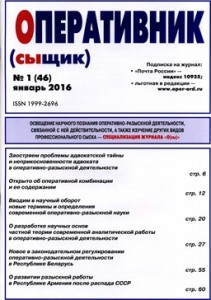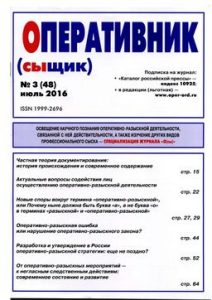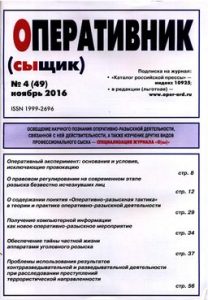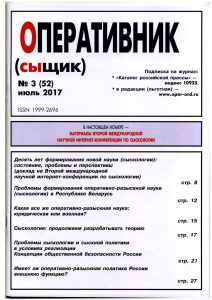Field Investigator (Sleuth). Issue No. 3 (52) for 2017
History of Professional Investigation and Operative Search Activity
Tatyana Lvovna Matiyenko, Professor of the Moscow University of the Ministry of Interior of Russia, Doctor of Law, Assistant Professor, e-mail: pet4332@yandex.ru.
The traditions of national historiography of the political and general investigation.
Annotation. On the basis of the analysis of works of pre-revolutionary authors, scholars who belonged to the Soviet historical-legal school, and contemporary authors the traditions of Russian historiography of the political and general criminal investigation are traced in the article. The author concluded that until the mid 1990-es its understanding as the function of the police was typical of investigation historiography. Since the end of the XX century there appeared a group of authors, tending to the identification of the pre-revolutionary investigation with modern operative search activities. At the present moment, there is an uncompromisable combination of these two approaches leading to non-coordination of the conceptual apparatus that prevents the formation of methodology of studying the history of the Russian investigation.
Key words: general criminal investigation, operative search activity, a political inquisition, investigation (sysk), syskologia, historiography.
Problems of Theory and Practice of Modern Operative Search Activity
Basic problems of syskologia formation
Alexander Yulievich Shumilov, Russian Customs Academy, Professor at the Chair of Operative Search Activity at the Law Enforcement Institute, Doctor of Law, Professor, e-mail: oper-ord@mail.ru.
Ten years of a new science (syskologia) formation: state, problems and perspectives (a report made at the Second international scientific online conference on syskologia).
Annotation. The results of the Second international online conference on syskologia are summed up. Realia of syskologia forming ( in the narrow and the broad senses of the word) are considered in the article. Some problems of forming the science are analyzed. Perspectives for further scientific research are outlined in the article.
Key words: operative search activity, operative search science, perspectives, professional investigative activity, investigator (syskolog), syskologia, science formation.
Ivan Ignatyevich Basetsky, Editor-in-Chief of the Scientific-Practical Magazine «Bulletin of the Academy of the MIA of the Republic of Belarus», Member of the Editorial Board’s Foreign Section at O(sy), Doctor of Law, Professor, Honored Lawyer of the Republic of Belarus (Minsk, Republic of Belarus), e-mail: nio_academia@mail.ru.
Problems of formation of operative search science (syskologia in the narrow sense of the word) and the operative search reality of the Republic of Belarus perceived by this science.
Annotation. The article is devoted to the current state and perspectives of research of the mentioned problem of forming operative search science (syskologia) in the Republic of Belarus, possibilities and peculiarities of creative interaction with the founder of syskologia and the scientific school of syskologists Alexander Yulievich Shumilov, Doctor of Law, Professor, and member of the Editorial Board of the journal «Field Investigator (Sleuth)» Boris Aristarkhovich Spasennikov, Doctor of Law, Professor.
Key words: detective law institutes, general search theory, operative search activity, detective processualogia, syskologia, detective law, criminal processualogia, private search theories.
Victor Mikhailovich Koryakin, Professor of the Military University (Moscow), Doctor of Law, associate Professor, e-mail: korjakinmiin@rambler.ru.
On the issue of a sectoral affiliation of operative search science.
Annotation. Different views on the place of operative search science in the system of sciences are analyzed in the course of scientific discussion. It has been proved ineffective and unscientific to refer operative search activities to military sciences.
Key words: military security, military science, operative search activity, operative search science, law.
Valery Pavlovich Kroshko, Honorary Member of «O(sy)» editorial board (Kiev), e-mail: e-mail: kroshko-valerijj@rambler.ru.
Syskologia: theory in criminal investigation and problems.
Annotation. Theory and practice of professional investigation require deep knowledge of the elements of the logical structure of investigation philosophy. Hence, the article is devoted to some problems of investigation theory.
Key words: general theory of investigation types, «the problem of investigation (sysk).», syskologia, nature, structure, function, «investigation fact», philosophy of investigation, special investigation theories.
Alexander Egorovich Sharikhin, professor at the chair of prosecutor activity fundamentals, Russian Academy of the Prosecutor General, Doctor of Law, Professor (Moscow), e-mail: profalex54@yandex.ru.
Problems of syskologia and investigation policy when realizing the Conception of public security in Russia.
Annotation. At present operative search science which no longer needs recognition but requires its potentials being defined has been formed in Russia. On this basis operative search policy should be formed specifically for effective ensuring public security in Russia.
Key words: departmentalism, conception, scientific schools, operative search policy, public security, syskologia.
Problems of certain conceptions, doctrines and theories of syskologia under formation
Stanislav Vasilievich Bazhanov, Senior Research Fellow, Department of Prosecutor’s supervision problems and strengthening the rule of law in the economy, Research Institute of the Academy of the Prosecutor General of the Russian Federation (Moscow), Doctor of Law, Professor, e-mail: svb-1956@mail.ru,
Andrey Alexandrovich Vorontsov, Senior Research Fellow, Department of Prosecutor’s supervision problems and strengthening the rule of law in the economy, Research Institute of the Academy of the Prosecutor General of the RF, Counselor of Justice.
Legalizing the notion «within jurisdiction» in operative search legislation as a factor contributing to the timely exposing, disclosing and investigating economic crimes.
Annotation. The authors’ point of view on the necessity to legalize the notion «within jurisdiction» in the Russian operative search legislation is given in the article.
Key words: exposure, legalization, operative search legislation, crime, disclosing, investigation, factor.
Nikolai Petrovich Vodko, Member of O(sy) board, Doctor of law, Professor, Honored lawyer of the Russian Federation, e-mail: Nikpetvod78@mail.ru.
Whether the operative search policy of the Russian Federation has an external function.
Annotation. Based on the analysis of certain norms of the Federal law «On operative search activities» in the manner of scientific debate the author gives his point of view on the doubtful distinguishing of external function of operative search policy.
Key words: operative search policy, foreign investigative policy, domestic investigative policy, function.
Alexander Fomich Volynsky, Professor at the Chair of Forensics, Moscow University of the Russian Ministry of Internal Affairs (MIA) named after V.Ya. Kikot, Doctor of Law, Professor, Honored Worker of Science of the Russian Federation, Honored Lawyer of the Russian Federation, tel.: 8-495-623-6290.
Operative search activity: why does the Criminal Procedural Code of Russia allow it possible but it is not admissible?
Annotation. The author considers some issues of organization and legal regulation of operative search activity using its data in the process of proving in criminal cases; measures for their solution are offered.
Key words: interaction, proof, investigation, legalizing, operative search activity, experience, prejudice, Criminal Procedural Code of the Russian Federation.
Roman Grigorievich Drapezo, Senior lecturer at the Chair of Criminal Process and Forensics, Kemerovo State University, e-mail: uri_nit@kemsu.ru,
Valery Kolossovich Znikin, Doctor of Law, Professor at the Chair of Criminal Process and Forensics, Kemerovo State University.
Darknet as a source of detective information.
Annotation. For the first time digital traces and mechanisms of their formation in the dark sector of the Internet (darknet) are described on the example of illegal trafficking of narcotic and psychoactive substances. The ways of fixing tracks and technical methods of counteracting the category of cases under study are given. They try to transform digital tracks into detective information and offer the most optimal methods, techniques and tools for operative work.
Key words: bit-coins, dark-net, information security, crypto currency, detective information, syskologia, «dark» Internet, digital traces.
Nikolai Semyonovich Zheleznyak, Siberian Law Institute of the Ministry of Internal Affairs of Russia, (Krasnoyarsk), Doctor of Law, Professor, Honored Lawyer of the RF, e-mail: zhns21@mail.ru.
On the influence of operative search science on the practice of professional detection.
Annotation. A brief excursus to the operative search science and the comparative-legal analysis of the concept of dwelling as an object of operative search activity are presented in the article.
Key words: dwelling, law, operative search activity, operative search science, concept, entering.
Konstantin Mikhailovich Lobzov, professor at the chair of information security, IGUPIT (Moscow), Doctor of Military Sciences, Associate Professor, Honoured Worker of Higher Professional Education of the Russian Federation, e-mail: lobzovk@mail.ru.
Agent network in the theory and practice of operative search activity (experience of theoretical-methodological analysis ).
Annotation. The article contains the author’s interpretation of agent network as a system which elements are unity and interconnection of agent and operative staffs as specific social institutes, and its structure is their operative-agent interconnection for solving problems of special and law enforcement bodies. Some principles concerning the origin and existence of agent networks are presented.
Key words: agent, agent staff, agent relations, agent network, agent penetration, vertical interconnection, horizontal interconnection, operative search activity, operative staff, organizational operative interaction, informer, system, social institute.
Makhtai Shapievich Makhtaev, Professor at the Chair of Forensics, Law faculty of MSU named after M.V. Lomonosov, Doctor of Law, e-mail: mahtaev@mail.ru.
Some theoretical aspects of forensic ensuring crime prevention by investigative bodies.
Annotation. The article is devoted to some theoretical questions of forensic prevention of crimes in the sphere of operative search activity.
Key words: forensic support of crime prevention, operative search activity, crime prevention, operative search science, investigative bodies.
Nadezhda Nikolaevna Potapova, Deputy Head of the Chair of Operative Search Activity of Law-Enforcement Bodies, Nizhny Novgorod Academy of the Ministry of Interior affairs of Russia), PhD in Law,
Oksana Igorevna Dolgacheva, Associate Professor at the Chair of Preliminary Investigation, Nizhny Novgorod Academy of the Ministry of Interior affairs of Russia, PhD in Law, e-mail: de1.fakto1@gmail.com.
On the issue of the need to develop a competence model of a confidential employee for the internal affairs bodies.
Annotation. The issues of confidential assistance and confidential cooperation with the internal affairs bodies are considered, the need for the development of a competence confidant’s model is substantiated, and its optimal structure is proposed in the article.
Key words: competence model, confidant, operative search science, operative search art, assistance, cooperation.
Natalia Vasilievna Prosandeeva, professor of politology faculty, State University of Humanitarian Sciences (Moscow), Doctor of Philosophy, associate professor, e-mail: bardina_natasha@mail.ru.
Theoretical approaches to investigating and counteracting extremism and terrorism and their taking into account in operative search science.
Annotation. Potentials of theory in substantiation of counteracting extremism and terrorism are indicated in the article. The author presumes that the struggle against ideological and world-outlook phenomenon, which Islam extremism presents, requires ideological response as after directive «cancellation» of ideology the process of arbitrary structuring of public consciousness starts or forced ideological structuring from outside takes place. The core point is the understanding of symbolic power loss by our country over the ideological space of Russia.
Key words: global jihad, ideology, left-liberal ideology, neomarxism, operative search science, right-liberal ideology, Sufism, terrorism, moderate Islam, extremism.
Aslyam Nailevich Khalikov, Professor of Law Institute, Bashkir State University (Ufa), Doctor of Law, e-mail: han010@yandex.ru.
The main features and stages of operative search process.
Annotation. Operative search process is viewed as a system of operative and investigative activities in a practical way, which has its binding characteristics. The main characteristics of the operative search process are independence, normativeness, foundation on material standards, staging, documentary, the interrelationship with the criminal process when using the results of operative work, participation of bodies engaged in the operative search activities.
Key words: documentation, pre-investigation check, operative information, operative search activities, operative search science, operative search process, operative search agencies, process stages, criminal proceedings.
Tribune of Candidates for Degrees in Law
Igor Lvovich Khromov, Professor at the Chair of operative search activities and special equipment of the Moscow University of the Ministry of Internal Affairs of the Russian Federation named after V. Ya. Kikot, Doctor of Law, Professor, e-mail: marina@kfk-tamp.ru,
Victor Sergeevich Stelmakh, adjunct at the Chair of operative search activities and special equipment of the Moscow University of the Ministry of Internal Affairs of the Russian Federation named after V. Ya. Kikot.
Operative search characteristics of crimes with extremist nature.
Annotation. The article reveals the essence of operative search characteristics of extremist crimes. The basic elements of operative search characteristics affecting the identification, suppression and disclosure of crimes of an extremist orientation are defined. Taking into account patterns and groups of elements constituting the content of operative search characteristics of crimes related to extremist activities are its main and optional ways of committing these crimes and the criminogenic factors that contribute to their making.
Key words: operative search characteristics, operative search elements, units to combat extremism, crime of an extremist orientation, extremism.
Review Page
Victor Fedorovich Lugovik, Professor at the Chair of Operative Search Activities of Internal Affairs Bodies, Omsk Academy of the Ministry of Internal Affairs of Russia, Doctor of Law, Professor, Honored Lawyer of the Russian Federation, e-mail: vlug@yandex.ru.
On the monograph «Guaranteeing human rights when carrying out operative search actions» prepared by А.Е. Chechetin.
Annotation. The monograph «guaranteeing human rights when carrying out operative search actions» by A.E. Chechetin is reviewed. The author’s conceptual outlooks on ensuring rights and freedoms of human being and citizen in operative search activity are analyzed as well as his opinions on the concept, structure, classification of operative search actions are given.
Key words: guaranteeing human rights and freedoms, operative search activity, operative search actions, legal regulation.
Index of the Articles Published in 2016
№ 1(46) January 2016 |
№ 2(47) April 2016 |
№ 3(48) July 2016 |
№ 4(49) November 2016 |

